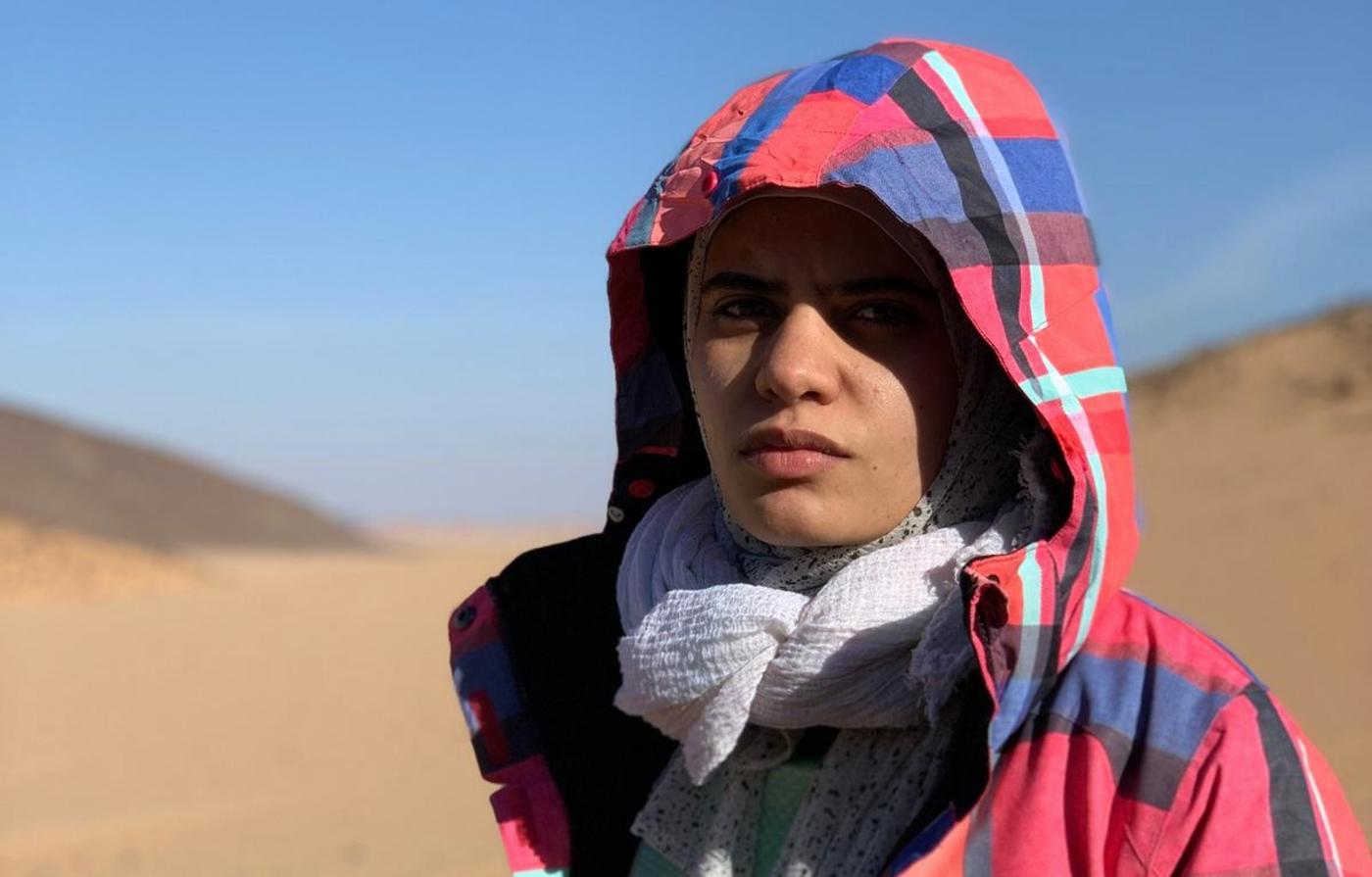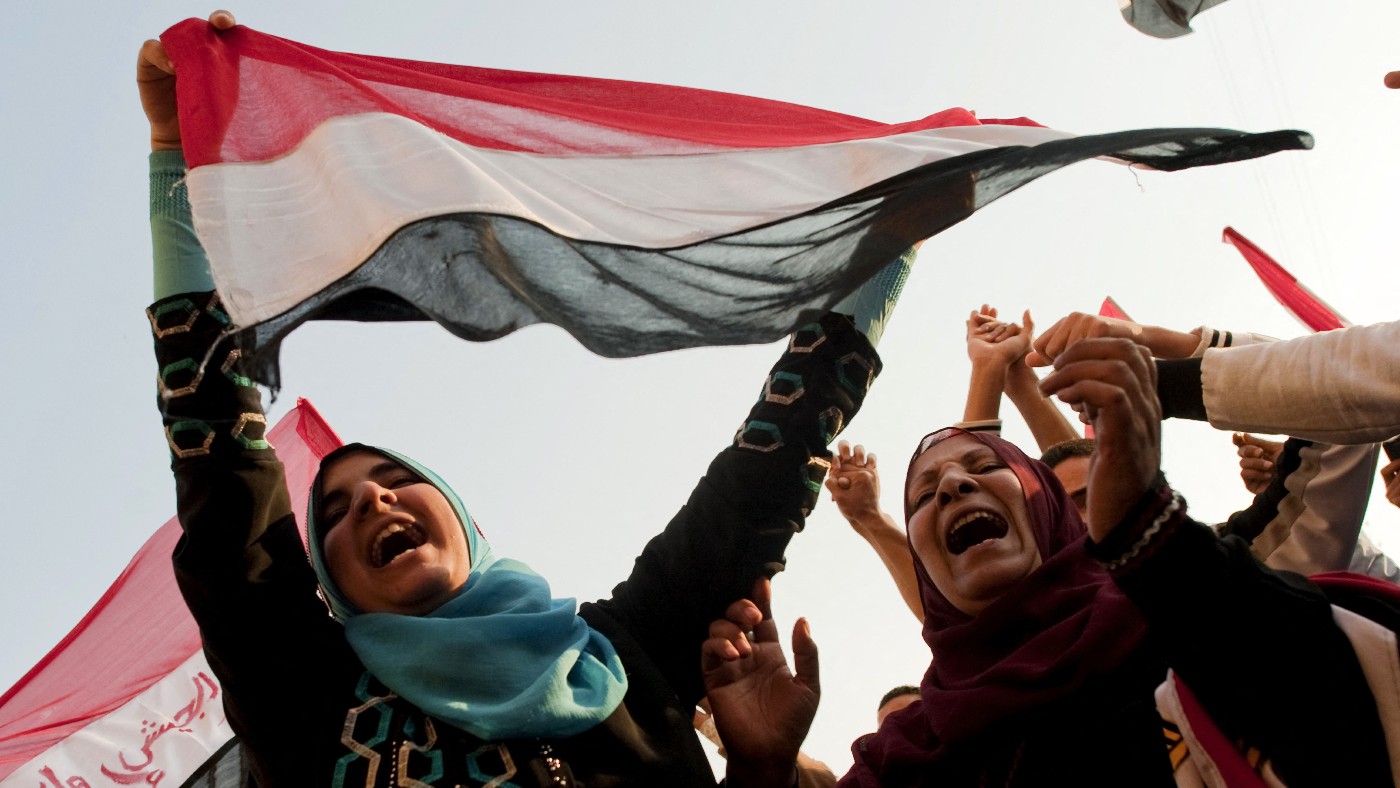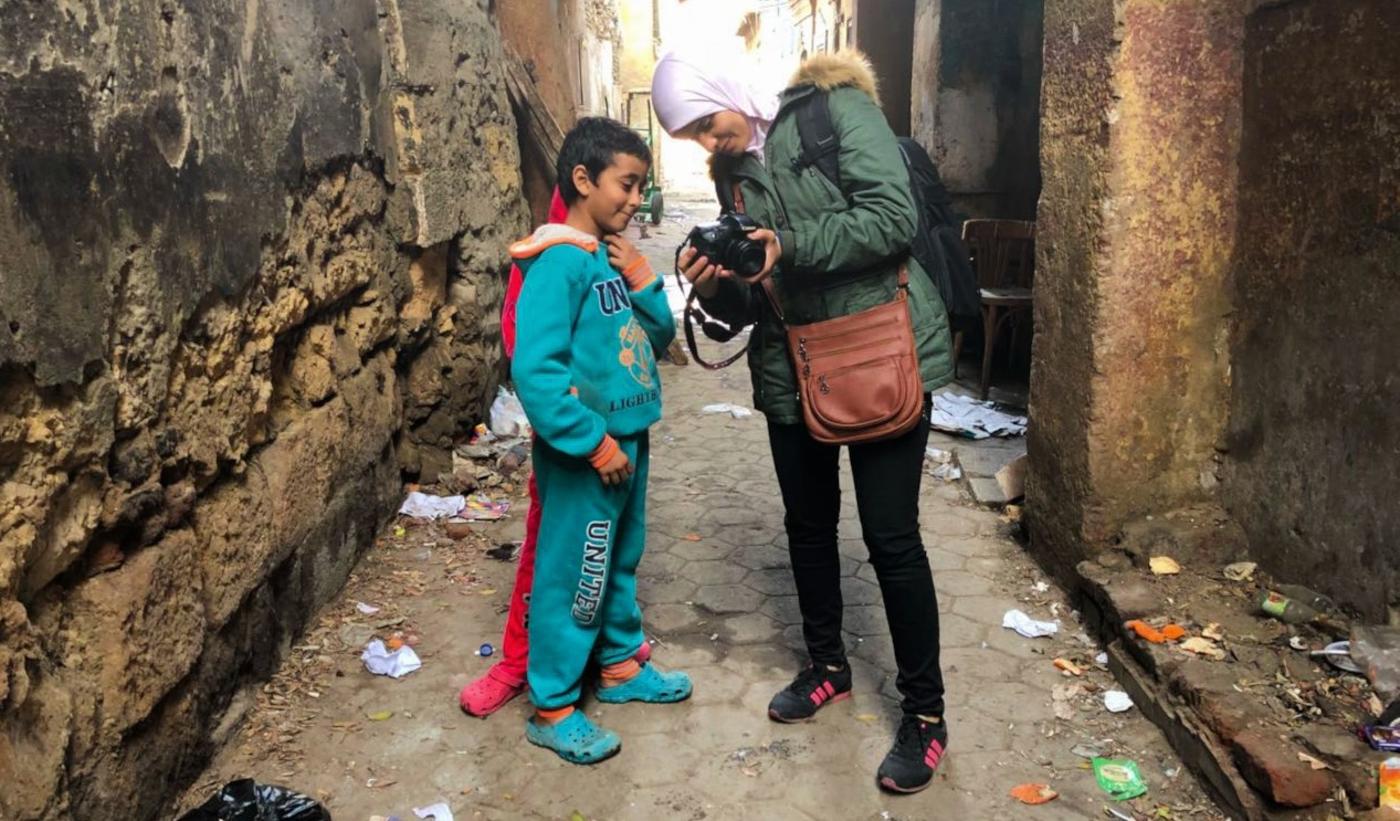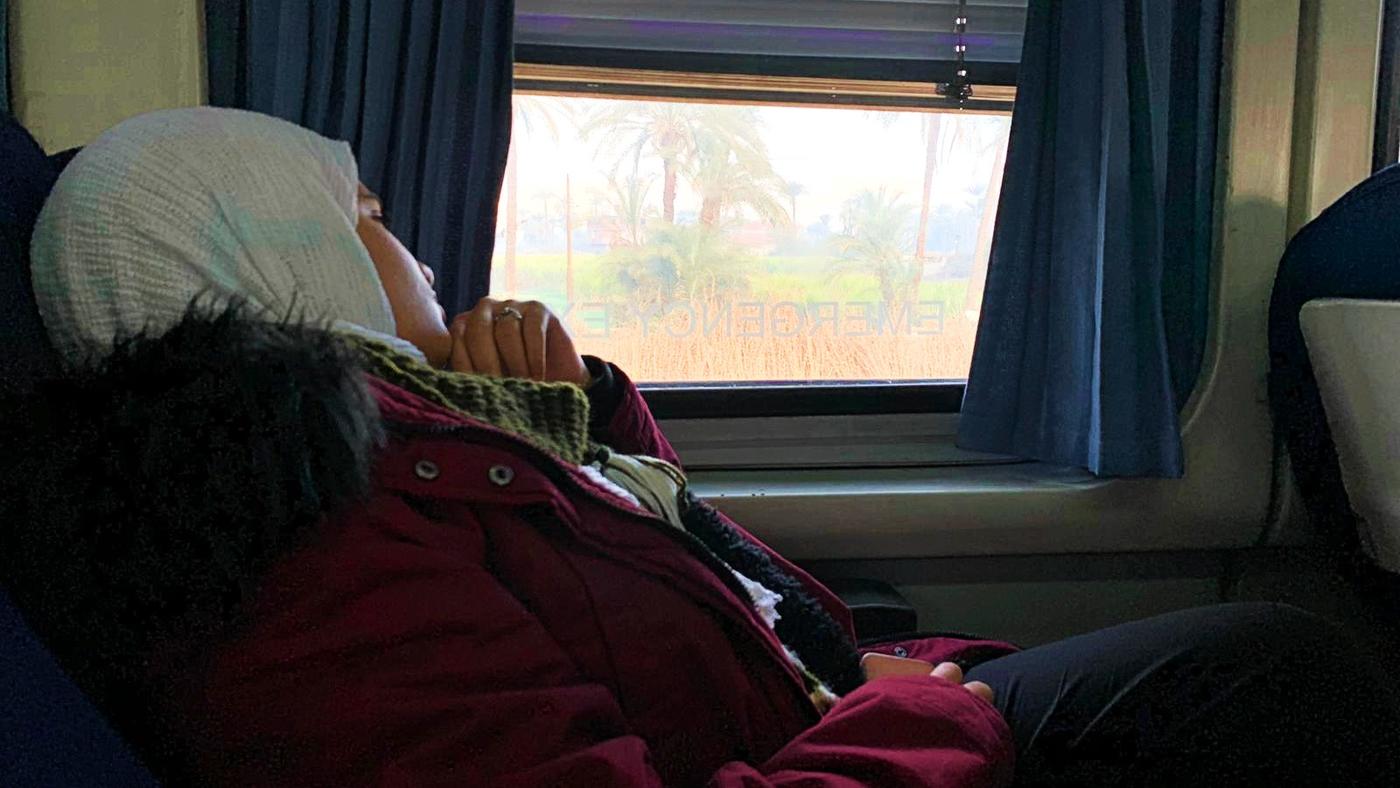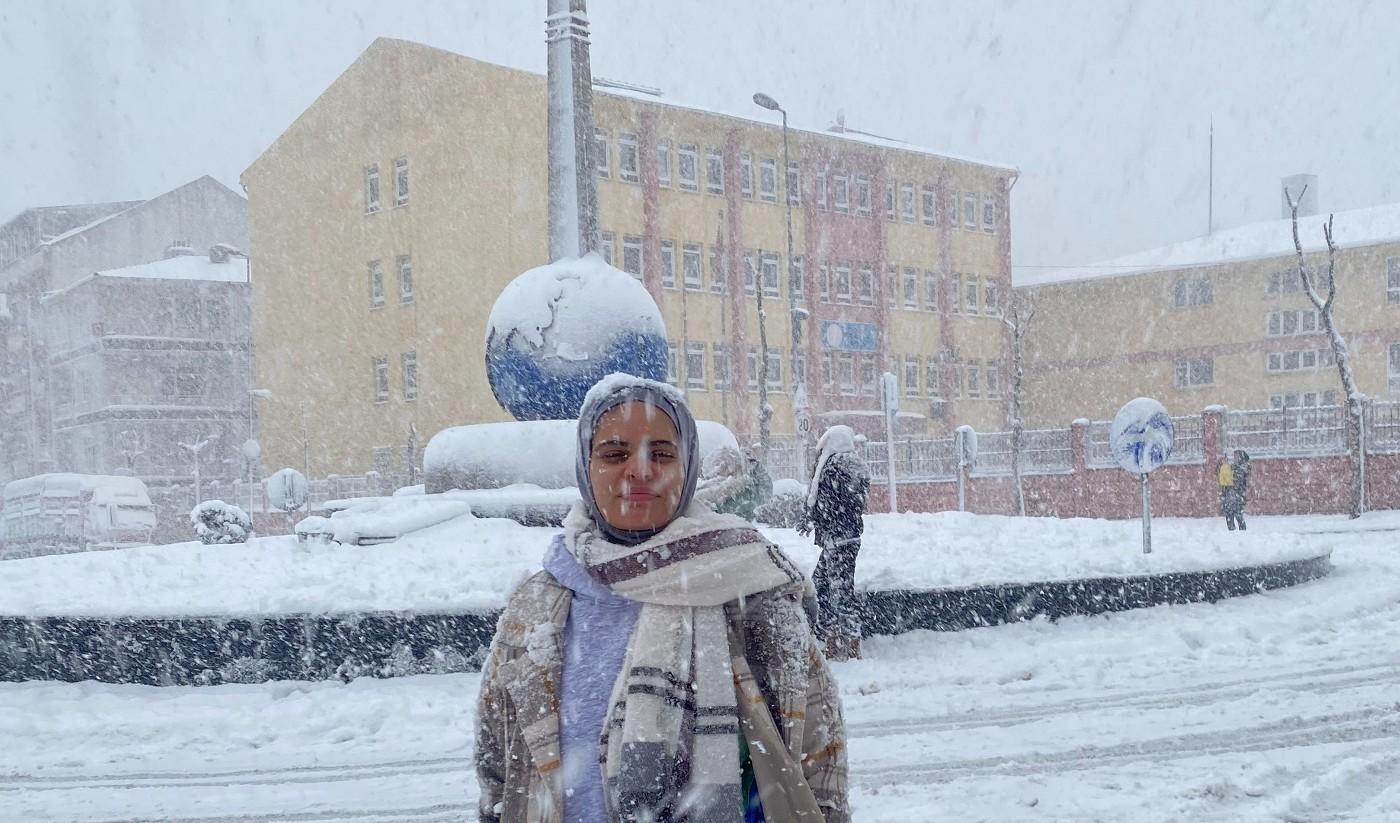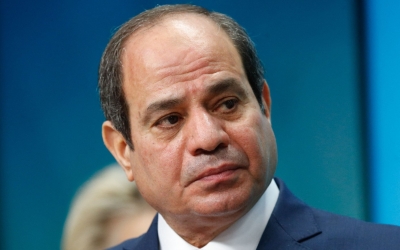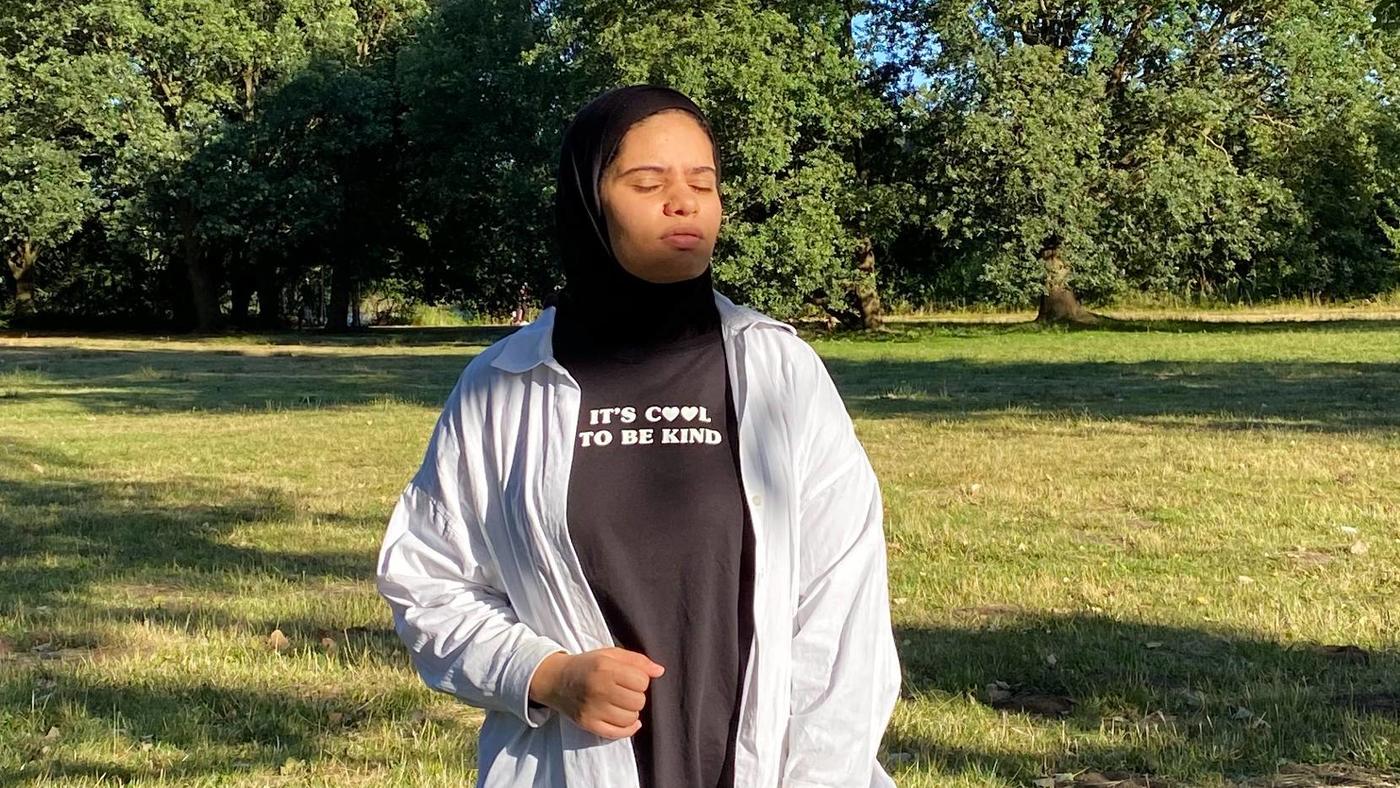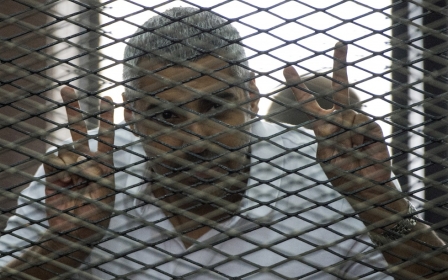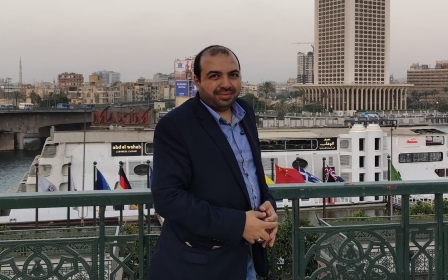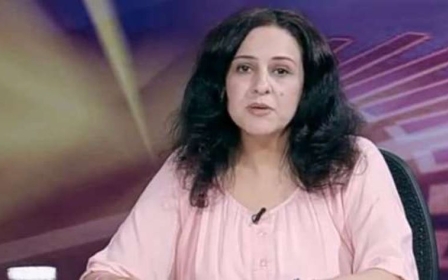Escape from Egypt: How I fled the media crackdown
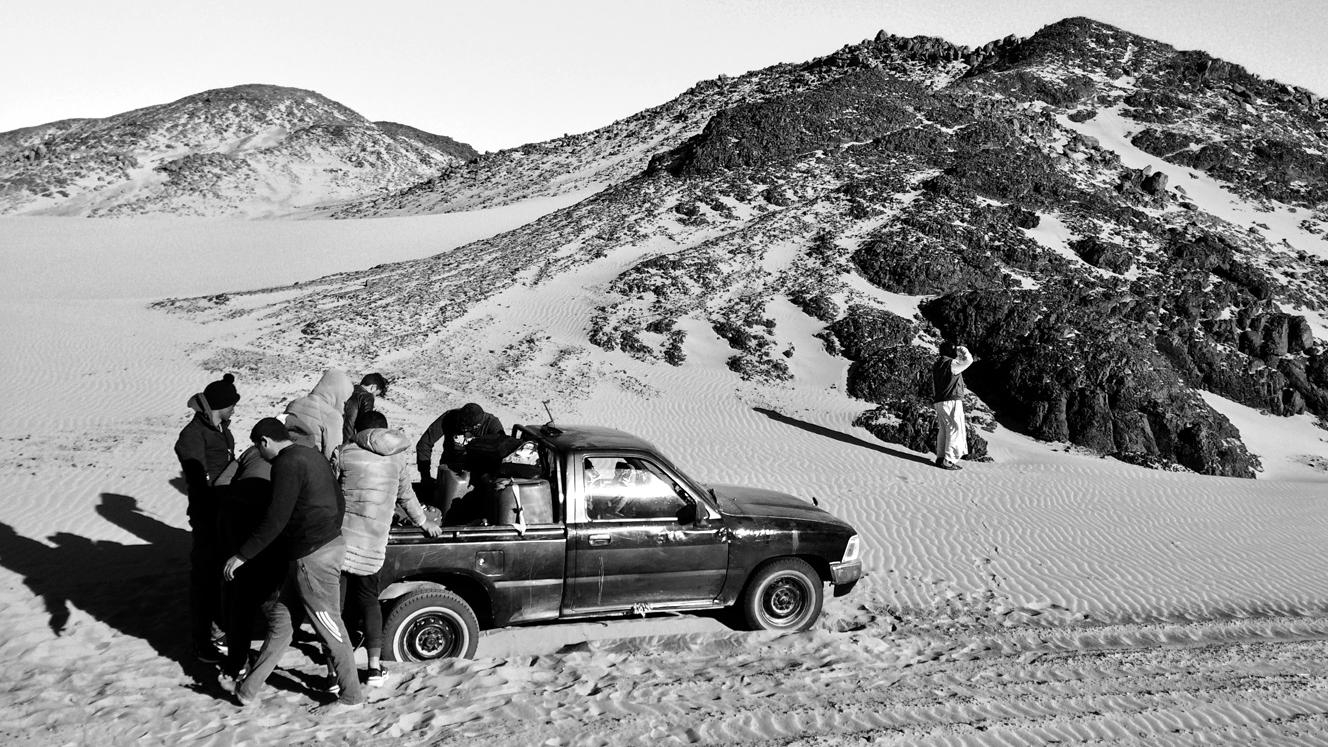
The battered truck ground to a halt in the desert. It could go no further, its back wheels spinning in the dirt. A group of men, wrapped in coats against the encroaching cold, jumped down and tried, without success, to dig it out of the sand.
It was not the first time that the vehicle, stranded just north of the Egypt-Sudan border, had broken down – but it had never been as bad as this before.
The dozen or so passengers stood and watched as the hours dragged on. Among them was photo-journalist Somaya Abdelrahman, 26, wrapped in two jackets, a scarf and a hijab to protect her from the chill.
She did not know the names of her fellow travellers, nor did they know hers. But they all had a common goal – to escape Egypt.
“All I remember was the pain of waiting, of fear,” Abdelrahman recalls. In the coming days, months and years that unrelenting pain would return to haunt her sleep.
“I kept thinking about our fate if the border guards found us," Abdelrahman says. "We might be killed because the guards had a direct order to shoot. I just thought: ‘I do not want to die.’ During those moments, I hoped that luck would be my companion.”
Sisi and the war on the media
Egypt has one of the most authoritarian approaches towards press freedom in the world. Reporters Without Borders ranks the country 168 (out of 180) on its world press freedom rankings, and calls Egypt “one of the world’s biggest prisons for journalists”. Dozens of journalists have been imprisoned. The independent press is dying. Hundreds of websites have been blocked or are mostly inaccessible.
Abdelrahman was born in the northern coastal governate of Beheira in 1996. The media at the time was suppressed by long-time president Hosni Mubarak: her father, a prayer leader in the neighbourhood mosque, was arrested in 1998 and accused of trying to overthrow the Mubarak government.
"My father did not belong to any political party," she says. "He was arrested because he was an imam of a mosque during Mubarak's rule and was talking to people in the Friday prayer sermon about the importance of rejecting corruption and fighting injustice."
Her father was then imprisoned for seven years at both the state security HQ and Abadiya prison in Damanhour. “I was very young at that time, but I remember that security used to kidnap him, hide him, and torture him from time to time,” Abdelrahman says.
Later, the family moved to Cairo, and were among the millions who took to the streets in 2011. “We sat in Tahrir Square until the day Mubarak stepped down,” says Abdelrahman, who was 14 at the time. “There were discussions about whether we should leave or stay in the square until the revolution's demands were fulfilled. My father supported staying until the demands were met, especially justice for the martyrs and victims of the revolution.
“I remember very well when the resignation speech was broadcast in the square, everyone screaming, laughing and feeling strong. I remember tears around me and people hugging each other and celebrations.”
She also recalls her father’s joy when the headquarters of the National Security Agency burned, which contained files on opponents of Mubarak. “I remember my father cried. His files were inside this place. He was kidnapped, imprisoned and tortured.”
Abdelrahman is no longer in contact with her father, who became violent after his release. "My mother told me that before his arrest, he was affectionate and kind, but he became cruel and violent because of the torture he was subjected to for years.
"I also saw signs of torture on my father's body, marks from electric shocks on his back and neck, and his leg."
And her hopes for a freer society ended in 2013 after the army ousted Mohamed Morsi, Egypt’s first democratically-elected leader. In the years since Sisi became president, the Egyptian media has become shackled by companies owned by the Egyptian Intelligence Service, which effectively controls most of the sector.
'I also saw signs of torture on my father's body, marks from electric shocks on his back and neck, and his leg'
- Somaya Abdelrahman
In 2014, Abdelrahman began studying at Helwan University, south of Cairo but dreamed of becoming a photojournalist “because of the revolution and what I saw, to document the truth”. Soon she was training in her spare time.
She was also active in student politics as part of the Muqawima movement, defending the rights of students, including those who had been detained; advocating free education and university books for study; and supporting the ethos of the January revolution, including freedom, social justice and human dignity.
She worked first at Al-Bawaba News and then, in 2017 at Veto, a pro-government platform run under the auspices of the security services. Abdelrahman wanted to pursue stories about human rights abuses, political violence and the worsening economy, but faced opposition from managers because it was against Veto’s editorial policy. Instead her stories appeared on al-Jazeera TV – minus her name for safety reasons.
Eventually, in June 2018, Abdelrahman and fellow photojournalist Islam Jomaa were summoned by the head of the newspaper’s photography department, who dismissed them without explanation and withdrew their press cards.
At dawn the next day, Jomaa was arrested at his home by the National Security Agency, and disappeared for 44 days. When he reappeared in late August, he had been charged in relation to Case 441/2018, which accused a large number of journalists and others of belonging to a terrorist group and spreading false news.
“My family and I were afraid and decided to leave our house,” Abdelrahman says. “We moved to another house in a city outside Cairo."
No passport, no escape
Abdelrahman began applying for grants for photojournalists and was accepted by the Magnum Foundation, founded by members of the prestigious Magnum Photos collective, in cooperation with the Afaq Foundation of the Ministry of Culture and Arts in Beirut.
She wanted to focus on the issue of female genital mutilation (FGM) in Egypt, to which she herself had been subjected to when she was 10. The country has one of the highest rates of FGM: an Egyptian Family Health Survey (EFHS) report in 2021 stated that 86 percent of Egyptian married women between the ages of 15 and 49 had undergone the procedure.
In late August 2019, Abdelrahman went to Cairo International Airport to fly to Beirut for a one-week workshop as part of her grant. There she was stopped, detained for eight hours and interrogated. Eventually she was allowed to leave but her passport was confiscated. It took her three months to obtain a replacement which could easily be confiscated again, effectively trapping her in Egypt.
Abdelrahman’s plan now was to stay away from press and politics so that she could escape from Egypt. "If I stayed in Egypt then I would either lose my passion for my work, which is the meaning of my life and which I love, or else be imprisoned. It was a time when I was dead."
She adopted a lower profile, changing her phone numbers and refusing to publish anything, even on social media, about politics. She also moved to Marsa Alam, a Red Sea resort, where she became a wedding and party photographer for tourists.
Karim Abdel-Rady, the executive director of the Law and Democracy Support Foundation based in Berlin, has too often seen cases such as Abdelrahman’s. A lawyer and human rights defender, he has been exiled in Germany since June 2021, fleeing Egypt in November 2020 via Lebanon, Turkey, and Kenya.
In Egypt, Abdel-Rady represented journalists and human rights activists, including thousands arrested on 20 September 2020 for demonstrating against Sisi. He was also investigated as part of Case 173 which targeted groups accused of being foreign-funded, as well as harassed and threatened with arrest.
The confiscation of passports by the Egyptian authorities, Abdel-Rady says, is a frequent tool used by the current government in disregard of Article 62 of the Egyptian constitution, which states that “freedom of movement, residence and immigration are guaranteed”.
"Disrupting travel can include illegal investigations by security services at airports, cancelling flights, even preventing travel and seizing passports, which have become a way to restrict journalists and human rights defenders. It is usually a unilateral decision taken by the security services and can be done without laying any charges.”
Sudan, the only choice
Abdelrahman knew her best option to get out of the country was by land, smuggled through Egypt’s southern border into Sudan. She made contact with smugglers, who charged her $1,000 for the trip.
“I was told by the smugglers: 'If the border guards find us, they will shoot because they have orders to shoot directly at those who run across the border'. I accepted this because I was also dead in Egypt. But at least fleeing was a form of trying to survive, it was an escape to life.”
On 16 January 2020, Abdelrahman took the train south from Cairo, met her contact and was then taken to a car. Under the false name of Amal, she joined join seven other Egyptians in a truck heading for the border with Sudan. They were joined by two Ethiopians, looking to eventually reach Israel. Often their vehicle was the only one on the road.
The smugglers told the group to turn off their phones so they could not be traced. Each was wary of sharing personal information with the others. “We did not talk much and we did not use our real names but we all had problems because of our politics or court rulings.”
Abdelrahman did not tell friends or family of her route, lest they became anxious or were put in danger. “I just told them I would flee, but neither how nor where. I said to my mother: ‘When I settle in a country, I will tell you, and I do that to be safe.” Abdelrahman later learned that the security forces had visited her father after she left.
Among her fellow passengers was a teenager, about 16, who said he was a member of the Muslim Brotherhood. Many of his relatives had already been imprisoned: he had decided to escape, he told Abdelrahman, to avoid their fate. “He did not stop crying for his family, who might never see him again.”
Then the truck became stuck in the desert, freed only after several hours of hard work. Eventually the group crossed into Sudan on 20 January.
'I cried when I crossed the border. The threats of imprisonment or enforced disappearance were over'
- Somaya Abdelrahman
“I cried when I crossed the border,” Abdelrahman recalls. “The threats of imprisonment or enforced disappearance were over. But it also hurt because I realised that I would never see my family again and that the life that I knew before ended here, with all its memories.
"No one in my family has tried to travel before. They are afraid to take this step, in case something like what happened to me at the airport would happen to them, also because of our political position as well."
Freedom also brought temporary restrictions. Still wary of being found, Abdelrahman hid in a safehouse in a Sudanese border town for a month.
“I was in a terrible psychological state, as I could not go out onto the street because I had been smuggled through. If I was arrested for any reason, I would be deported to Egypt before the smugglers had completed my travel arrangements on to Turkey.”
Eventually Abdelrahman obtained an entry stamp for $300 thanks to opposition contacts within the Muslim Brotherhood, of which she is not a member, forged during her time working with opposition media.
She then headed for Khartoum and the airport. There, she booked a flight to Cairo – but crucially with a stop-off in Istanbul. Abdelrahman wasn't going back to Egypt: she was escaping to Turkey.
Turkey proves no refuge
Abdelrahman didn’t have a visa when she arrived at Istanbul airport on 20 February. Instead she surrendered herself to the security forces. “I was detained at the airport for 22 hours and subjected to interrogation. I was verbally assaulted and forced into a deportation agreement back to Egypt.”
But she managed to make contact with members of the Egyptian Muslim Brotherhood in Turkey. "They are the ones who helped me and submitted a request to the authorities so that I could enter Turkey so that I would not be deported to Cairo," she says.
“I didn't have a specific plan to stay in Turkey or anywhere else," she says. “It's not about the country, but about being safe. When I left Egypt, I said to myself: 'The place where I will feel safe will be my homeland. When I felt fear and threat in Turkey, I will leave.'"
While in Turkey, Abdelrahman got married but the relationship soon became violent, including beatings that left her seeking hospital treatment. She reported the abuse to the police and a restraining order was issued but her abuser made further threats.
As a vulnerable refugee, alone and unsupported in Turkey, Abdelrahman says she was terrified, and decided not to pursue the matter further. “It was a toxic relationship, and I was able to get out of it with the help of psychiatrists,” she says.
Violence was not the only danger threatening Abdelrahman, as reconciliation took place between Ankara and Cairo. The two governments had been at odds since 2013 and the fall of Morsi. But as relations softened, opposition news channels in Turkey, such as Mekameleen TV went off the air, while Cairo asked Ankara to designate Egyptian opposition figures in Turkey as terrorists, including the likes of Hossam al-Ghamry.
Osama Heikal, the Egyptian information minister, described the moves by Ankara as a "good gesture". And this rapprochement sent a threatening message to Abdelrahman and other exiles: pack your bags or else risk deportation back to Egypt.
But to leave for a safe country she would need to renew her passport, the only official document she had, at the Egyptian embassy. Fears increased when she heard how an Egyptian citizen in Turkey had his passport seized by consulate officials at the consulate embassy.
At the same time, her photography was being recognised by the international media. Permanent Wound, her piece about female genital mutilation, was awarded the inaugural Emerging Photographers Fellowship Award in December 2020 by the international nonprofit Too Young to Wed, along with Canon USA.
In a statement, Abdelrahman spoke publicly of what had happened to her at the age of 10. “I remember the day as the worst of my life. To heal myself and my mind, I made a visual documentary of stories of women and girls who experienced FGM at some point in their lives.
"I firmly believe that visuals bolster a cause, and this is my means to encourage survivors, and more men, to rebel against the practice.”
The project appeared in the Washington Post on 4 January 2021, where photo assignment editor Kenneth Dickerman wrote that Abdelrahman’s persistence in the face of adversity helped transport her to where she is now.
"Of course I was happy," she says of the recognition. "And because I am a woman and a journalist, it is important for me that the world knows the true situation in Egypt with regards to women and journalists and what they suffer from."
By the end of the month, the Egyptian authorities tightened penalties for the perpetrators of the crime, which was met with increased demands for it to be banned completely.
New life in Germany
Finally, Abdelrahman found a way to leave Turkey. Looking to study in Germany, she was accepted on a six-month course in photojournalism and documentary photography at Hanover University, bolstered by her portfolio, experience and increasing international profile.
After obtaining a student visa from the German embassy in Turkey, she arrived in Hanover on 8 April 2022, then applied for asylum in late August.
Her hearing took place on 24 January. "I cried during the hearing before the judge," says Abdelrahman, who adds that she told her whole story so that she could be protected. It was also an epiphany. "I felt sorry for myself, for what I went through. It was the moment I realised what I have gone through."
Abdelrahman, while she waits for the results of the hearing, is learning German and attending photography lectures at the university. She is also looking at future journalistic projects, including producing a book, and documenting the experience of herself and other women who had to flee Egypt because of violence and injustice.
"My life in Egypt was full of fear of imprisonment,” she says. “My escape to Sudan was me fleeing to an unknown fate. I might be killed at some point. And in Turkey, my lack of luck chased me from danger again.
“I intend to make Germany my home, despite the pain of loss and exile. After everything I went through, I discovered that home is where I don't feel fear.”
Would she go back to Egypt?
"I wish I could, but I can't. If I go back to Egypt, I will go back to prison. There is no place for me in Egypt."
This article is available in French on Middle East Eye French edition.
Middle East Eye propose une couverture et une analyse indépendantes et incomparables du Moyen-Orient, de l’Afrique du Nord et d’autres régions du monde. Pour en savoir plus sur la reprise de ce contenu et les frais qui s’appliquent, veuillez remplir ce formulaire [en anglais]. Pour en savoir plus sur MEE, cliquez ici [en anglais].


